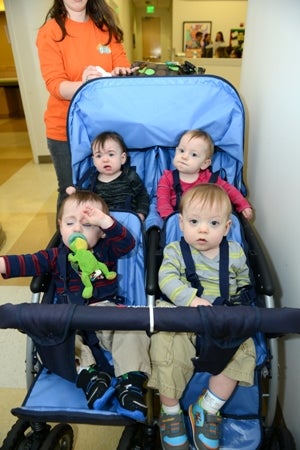Necrotizing Enterocolitis
Mike and Paula Estes of Abernant had always dreamed of having a large family. They started with Phillip, now age 3, and soon discovered they would need some help in providing him with a sibling. Paula’s doctor prescribed a very small dosage of the fertility drug, Clomid, and she soon became pregnant. Early in her pregnancy, she thought she might be miscarrying. That’s when a sonogram revealed she was going to have quintuplets. Since hers was a high-risk pregnancy, Paula was referred to the UAB Women & Infants Center (WIC) in Birmingham where she gave birth four months prematurely on Oct. 8, 2012. The tiny newborns – who ranged in weight from 1 pound 2 ounces to 1 pound 8 ounces – were whisked away to the Neonatal Intensive Care Unit (NICU), suffering from various complications of prematurity. Within days, Jack, Ashley, Michelle, Ann and Bruce developed necrotizing enterocolitis (NEC), a gastrointestinal disease that sometimes occurs in premature infants whose immature bowels are sensitive to changes in blood flow and prone to infection. All five of the Estes babies developed tears in their intestines, so they were transferred through a connecting crosswalk from the UAB WIC to Children’s of Alabama where they underwent a peritoneal drainage procedure. Although this course of treatment worked well for four of the babies, Michelle began hemorrhaging during the procedure and passed away at just 9 days old. For the next six months, the NICU at Children’s became Paula and Mike’s second home as their four surviving infants struggled to gain weight and to overcome various problems. In addition to NEC, all four were diagnosed with bronchopulmonary dysplasia (BPD), a lung disease characterized by inflammation and scarring in the lungs. BPD develops most often in premature babies who are born with underdeveloped lungs. After five months, the first baby was well enough to go home, and by late May of 2013, all four were out of the hospital. The Estes quads are doing well – although they are developmentally delayed and receive in-home therapy from a physical therapist, occupational therapist and special instructor. They also visit specialists at Children’s – including doctors from the Endocrinology team, who treat them for congenital hypothyroidism. Gail Mick, MD, and Leslie Pitts, MSN, CRNP, follow the quads closely. "Both Dr. Mick and Leslie work with them to see that they continue to gain weight and grow,” says Paula. “We have a trusting, caring friendship relationship with the entire team. It always is like you are talking with a friend or family member. Everyone at Children’s has been so supportive,” she adds. “I couldn’t ask for a better hospital or team of doctors and nurses to work with my kids.”







